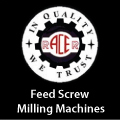
Home >> Resources/Information >> Extrusion, Twin Screw
History of twin screw extrusion
Source : Twin Screw extrusion, Technology and Principles
Author : James L. White
Publisher : Hanser Publishers 1990.
1937 - First Commercial development of a co-rotating twin-screw extruder by Robert Colombo and LMP of Turing, Italy.
1939 - LMP sold and delivered the first twin-screw extruder to the I.G. Farbenindustrie (currently BASF)
The Colombo Patent was licensed to R.H. Windsor, England, CAFL, France (now Clextral), and Ikegai Iron Works
1940 - Erdmenger and Meskat file many patents in twin-screw technology working with I.G. Farbenindustrie.
1945 - After Worldwar II, I.G. Farbenindustrie was broken into Hoechst, Bayer, BASF and Huls. Erdmenger developed self-wiping co-rotating kneading disc machines. Kneading discs were staggered into configurations which resemble screws
1953 - Erdmenger developed Kneading disc machines to pulverize agglomerated polymers Bayer AG had Werner & Pfleiderer of Stuttgart to develop a new generation intermeshing self-wiping Co-rotating extruder. W&P led by Fahr, Ocker, Fritsch and Herrman develop the Zwei Schencken Kneter (ZSK). Kraffe de Laudarede of Paris devised intermeshing disc containing slots.
1961 - Robert Colombo described an intermeshing Co-rotating twin-screw machine with modular screw and venturi-like barrel elements in a patent application.
1962 - Loomans & Brennan Jr. of Baker & Perkins (now APV Baker) file for a modular intermeshing twin screw machine that are left handed. Machines used for Reactive Extrusion, Continuous Poly Condensation and devolatilization of Polyester and Polyamide from pre-polymer in the machine.
1976 - Rathjen & Ullrich have slices in the screw flights which catch the crystals and break them up through shearing.
1981 - Berstorff Gmbh of Hannover introduce mixing or Kneading gears and screw elements that are incompletely self-wiping.
1988 - Werner & Pfleiderer introduces `Screw Mixing Elements' for gentler mixing than is given by Kneading disc elements.




